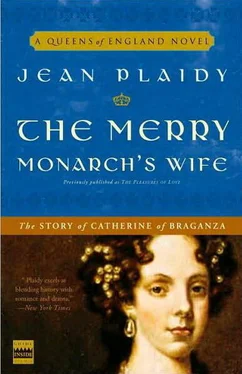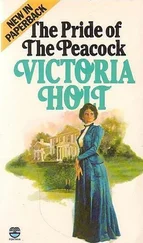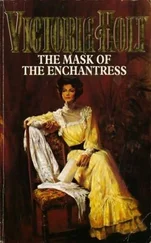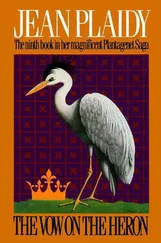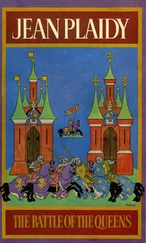Jean Plaidy
The Merry Monarch's Wife
But when I consider the truth of her heart
Such an innocent passion, so kind, without art
I fear I have wronged her, and hope she may be
So full of true love to be jealous of me
O, then ’tis I think no joys are above
The pleasures of Love.
CHARLES II
MY LIFE WILL END WHERE IT BEGAN, FOR IN THE YEAR 1692 I left England where I had gone some thirty years before as a bride to the most romantic prince in Europe.
I smile now to consider how ill-equipped I was for such a position, and when I look back I say to myself, “If I had done this…,” “If I had not done that…how much happier my life would have been.” But then, although I was not very young — I was twenty-four, which is a mature age for a princess to embark on marriage — I was quite innocent of the world and had hardly ever strayed from the walls of the convent where I had received my education, or the precincts of the royal palace. I had been brought up between the nuns and my mother with the strictest rules on moral rectitude, to be plunged into what was known as one of the most licentious courts in Europe. Naturally there was much which I could not understand and could not accept. I was lost and bewildered and desperately unhappy.
But when I came back to Portugal and my brother, Don Pedro, the King, gave me the Quinta de Alcantara, one of his summer palaces, where I lived in comfort, his wife, Queen Maria Sophia, became my good friend, and I was fêted by the people wherever I went. They could not forget that, by my alliance with England, I had helped to free them from the Spanish yoke.
Everywhere I went, I was assured of their gratitude and that was heart-warming.
When my health worsened, my brother sent me to the palace of Santa Martha and then to Belem where I have stayed. He and his Queen show great concern for me.
It was a great joy to visit the Villa Viçosa, called by some the Paradise of Portugal, where I was born and spent the first two years of my life in those idyllic surroundings. And as I wandered through those leafy glades, I thought of that day — my second birthday — which could be said to be the beginning of all that followed, for if my father had taken a different decision on that day, it is unlikely that I should have gone to England.
It is interesting to contemplate what my fate would have been; and there, in the Villa Viçosa, I decided to look back on it all, to ask myself how much my actions had played their part in that drama — which was sometimes a comedy, as I suppose all life is. I want to see it all clearly — the hopes, the dreams, the eager expectations and, after the bitter revelation, the joys, the pleasure, the pain and the passion: I want to live it all again in my thoughts.
There are days when I must take to my bed. I am plagued with illness and at such times my great solace is to escape into memory, to see again that glittering court; the elegant costumes of the men; the curled periwigs, the lace-edged breeches; the cloaks trimmed with gold cord; the feather hats; all proclaiming the joy to escape from Cromwellian puritan rule to royal splendour. And at the centre of it all, the King himself: merry, witty, gracious, rarely roused to anger and with a charm that exceeded handsome looks. It was small wonder that he fitted my dreams of him.
I had been quite young when I had heard that there was a possibility of his becoming my husband, and in the years that followed, in my thoughts, he became a romantic ideal. I wanted to hear all about him: his exile, his valiant attempts to regain the crown snatched from his murdered father. I loved him in the beginning, and for a time I believed he loved me too. He did in a way, but I had to learn that he was capable of loving many women at the same time. In fact, there were two deep abiding passions in his life: women, and, as I had heard him say, “never to go wandering again.”
I was feeling emotional after my visit to the Villa Viçosa. Donna Inez Antonia de Tavora, one of my favorite ladies-in-waiting, was with me. She said I was tired and she would prepare me for my bed.
My thoughts were far away in the past and I did not speak for a moment.
“I am tired, yes,” I said, “but not in the mood for sleep. I wish to amuse myself by writing. Bring my materials to me, Inez, please.”
If she were surprised she gave no sign.
She did as I commanded and I began.
I REMEMBER THE DAY CLEARLY, FOR IT WAS THE BEGINNING. It was then that I realized that the dream which had haunted me so long could come true.
We were working on an altar cloth — my ladies and I — and it was a task which had occupied us for weeks; the work was detailed and delicate and while we stitched one of us would play some musical instrument and we would sometimes sing together; at other times, one of the party would read aloud from some holy book. A great deal of our time was spent thus.
Presiding over us were those two ladies who were never far from me, for they had been specially selected by my mother to guard me. One was Donna Maria de Portugal, the Countess of Penalva; the other Donna Elvira de Vilpena, the Countess of Pontevel. They were much aware of their dignity and determined to do their duty by watching over me.
I was often exasperated by this, but I was generally of a docile disposition. I had led a very sheltered life and had scarcely been outside the palace walls or those of the convent where I had been educated; and I was inclined to accept my fate with a certain placidity.
Donna Maria was the senior of the two. She was the sister of Don Francisco de Mello, of whom my mother thought very highly. He was not only my godfather but he held a very important post, Ambassador to England.
England had always been held in great respect by my mother, even when the English murdered their King and set up a Commonwealth. Strong-minded, practical woman though she was, she had a strange premonition about that country, which was alien to her nature, for she was in all other matters firmly realistic; but where England was concerned she allowed her wishes to get the better of her usually logical reasoning.
As we sat there on that sunny afternoon, she came into the room. I knew at once that something important had happened. She rarely visited us unexpectedly. If she wished to speak to us she would send for us, and anything concerning us was generally of small consequence compared with matters of state with which she was usually concerned.
She was Regent of Portugal because my brother Alfonso was not suitable to be King. She had been in that position since my father’s death four years before, and though Alfonso was no longer a boy — he must have been seventeen at this time — she still considered him unfit to take on the burden of state; and she continued to rule.
None in royal circles questioned my mother — not even my father had done that; she had always been actively involved in state matters, so we knew something of great moment must have brought her to us on this afternoon.
We all rose and curtsied as she entered, and my mother turned to the ladies, which was a sign that meant they were to leave us.
“Donna Maria, Donna Elvira, you may remain,” she said.
A smile of satisfaction spread over Donna Maria’s face. She was delighted when her special place in the household was acknowledged. She immediately placed her chair for my mother and took another herself.
My mother acknowledged the service with a nod and, sitting, said: “I have news. The best of news. Dispatches have arrived from England.”
Donna Maria nodded her head to remind us all that they would have come from her shrewd and clever brother Don Francisco.
Читать дальше
